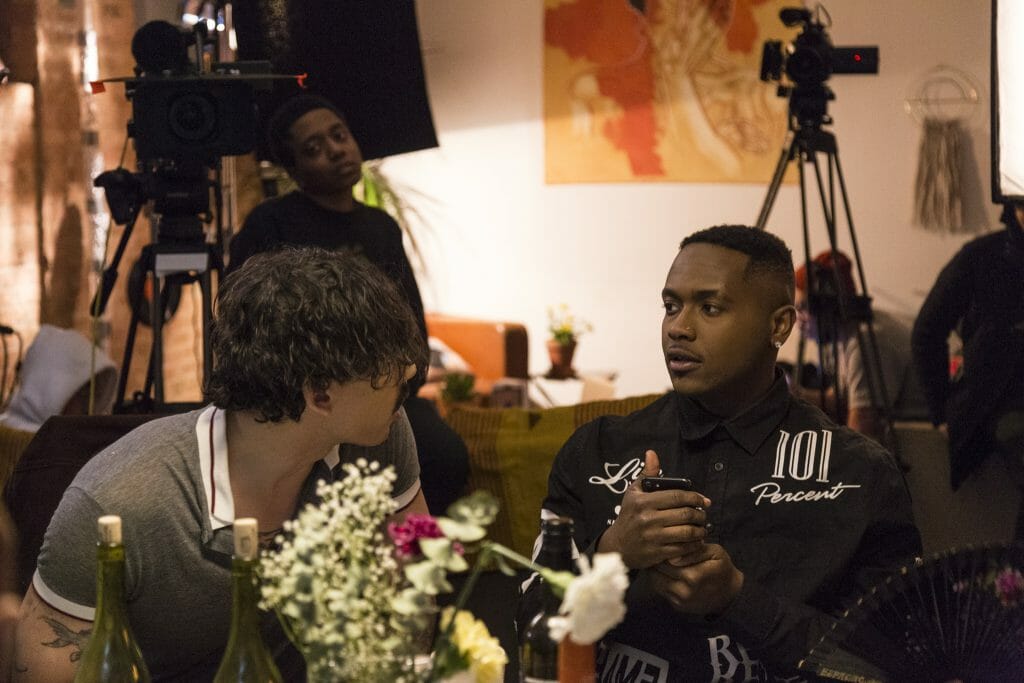And no, this isn’t another thinkpiece about the Oscars…the time has come for us to unpack harm and seek repair in the Film/TV industry.
By: Contributing Writers, McKensie Mack & Elijah McKinnon
Justin Ignatious Mitchell and David Davis on the set of Good Enough, an Open Television Original Series.
It’s been weeks since the “slap heard around the world” has garnered hundreds, if not thousands, of neverending think pieces. What’s missing from this conversation about a single event at the Oscars is how we actually confront harm and abuse within an industry where harrassment and abuse are both quite common. There seems to be a larger conversation we’re missing that’s even bigger than many social critics from outside of the industry would consider it to be. Film and Television are, by far, one of the most heavily consumed forms of media on the planet. On average, according to a recent report from Stastisa, audiences around the globe spend close to eight hours a day engaging with some form of media, with Americans spending “around 347 minutes per day engaging with traditional media, and 470 minutes engaging with digital media.”
Even as the industry canon of artists, producers, writers, cast, etc. has shifted to include a more just and equitable representation of our world, both on and off-screen, it is clear that our collective definition of harm, violence, and repair still exists on a wobbly foundation. We’re living in a time where prominent celebrities are talking about the events of the Oscars as if they work within an industry with zero tolerance for any forms of abuse or exploitation. This is gaslighting. To be clear, violence in every form is problematic, and perpetrators of harm should hold themselves accountable for their actions. But, how do we nuance that conversation in a culture driven by the disposability and “cancellation” of human beings?

Crew on the set of Good Enough, and Open Television Original Series.
In an industry dominated by glamor and social and financial capital, it’s often difficult for those working behind the camera to speak out about harm in the industry. Fear of retaliation and the potential loss of reputation, opportunities, and income makes it even more difficult for production workers to come forward. The work of prominent activists and organizers in the industry gives us some much needed insight as to how harm finds its ways onto sets around the globe. These individuals tend to be deeply marginalized and underestimated, making it that much more difficult to cultivate practices and policies that change these systems.
In GLAAD’s most recent Where We Are on TV Report (2021-2022), they share that LGBTQ+ characters make up 11.9% of series regulars on broadcast television; up 2.8% from last year, marking a new record high. We’re reaching critical mass in the strive for a more diverse and representative media landscape. Now, how do we create sets that actually keep LGBTQIA+ folks, Black and Brown folks, and other marginalized people safe in the face of harm? How do we develop practice and policy that shows people how to identify when harm is occurring and seek repair?

Ashley Battle on the set of Good Enough, an Open Television Original Series.
In collaboration, Open Television (OTV), a Black-led and Emmy-nominated intersectional web TV platform, and MMG, a Black and non-binary led change management and research firm based on the Southside of Chicago, are joining forces to lead a public research project inviting production workers to share their experiences with the state of harm, repair, and restorative justice within the film/tv and entertainment industry. #LightsCameraHarm is a survey with a goal of hearing from 1,000 production workers across the globe, and with a strong prioritization for LGBTQ+, gender expansive, disabled, and BIPOC respondents. All responses are kept anonymous.
From select interviews and survey responses, we will develop a full report which will include resources for production workers as well as a call to action directed towards those with the power and privilege to intervene, act, and transform systems, practices, and policies in the industry.

Elijah McKinnon (Co-Founder/Executive Director, Open Television) and McKensie Mack (CEO of MMG)
In the words of bell hooks, “True resistance begins with people confronting pain … and wanting to do something to change it.” We know when people are being harmed, and we have the privilege to look the other way or do something. True resistance means actionable intervention that protects the people most likely to be excluded, harmed, or targeted within any given community or industry, because justice goes beyond representation. Justice goes beyond diversity.
Learn more about #LightsCameraHarm, and take the survey before it closes on May 31, 2022, here.













